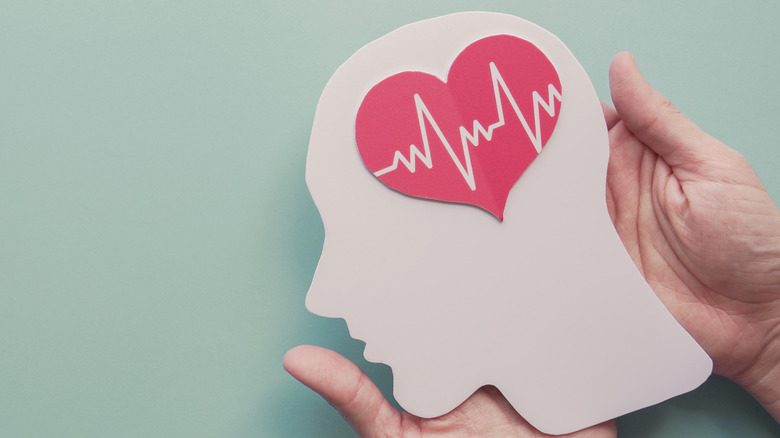Could Night Sweats And Hot Flashes During Menopause Indicate Something More Serious?
Whether menopause is many years away or right around the corner, the more you know about this natural change in life, the better. Most people know about the typical hot flashes, portrayed so over and over in television and movies. However, the truth is that menopause can cause a multitude of symptoms, from dry skin and thinning hair to sleep issues and mood disturbances (via Mayo Clinic). It can also cause more surprising symptoms like brain fog, immune dysfunction, palpitations, and anxiety.
Menopause is diagnosed after you go a full twelve months without having a period. The time leading up to menopause is known as perimenopause (via Cleveland Clinic). It can occur up to ten years before menopause and that's when symptoms can begin. Though the first sign is usually irregular periods, another sign is hot flashes. Now a new study says that hot flashes and night sweats may point to a future health issue.
How hot flashes and night sweats may be a sign of future brain health
According to a new study in the medical journal, Neurology suggests that women who experienced more hot flashes and night sweats than usual during menopause are thought to have more white matter hyperintensities on the brain, which can cause an increased risk of cerebrovascular issues.
Consequently, they may be associated with an increased risk of cognitive decline, stroke, and Alzheimer's disease. Director of cognitive neurology at NYU Langone Hospital, Dr. Shae Datta, explains (via Healthline), "We previously thought the symptoms of menopause were just a benign rite of passage in a woman's life — this may disprove that."
In the study, participants wore monitors that recorded hot flashes and night sweats by measuring skin temperature (via American Academy of Neurology). They also wore sleep devices and recorded their own physical observations in a journal. After three days, the women had their white matter hyperintensities measured using brain scans and blood tests.
What the study means and why more research needs to be done
There have already been well-known links between menopause and heart health including high blood pressure and high cholesterol. "Previous research showed us that menopause causes worsening of cardiovascular health during menopause," says Dr. Shae Datta. "Since cardiovascular health is closely tied to brain health, this study may give us more clues into brain health after menopause."
Though this study shows some interesting associations, more research needs to be done. This experiment was just a three-day study that included just 226 participants (via Neurology). Furthermore, all participants were mostly white women who were approximately 59 years of age.
According to Healthline, the study was done to investigate brain function during menopause, not to determine what causes strokes and dementia. "The authors were not attempting to define whether the underlying mechanisms of hot flashes or the hot flashes themselves may be contributory to changes in brain function and structure that could lead to neurological disease," says James Giordano, a professor and the chief of the Neuroethics Studies Program at the Pellegrino Center for Clinical Bioethics at Georgetown University Medical Center.
So far the research found a correlation between the hot flashes and night sweats of menopause and white matter hyperintensities in the brain. That doesn't necessarily mean that if you have hot flashes or night sweats, you will get Alzheimer's or a stroke. It also doesn't prove that white matter hyperintensities cause these cerebrovascular problems. It simply shows a correlation for now and more studies need to be done.


